

Why It's Hard For BigLaw Associates To Start Rainmaking. Two days ago, Ashby Jones at the WSJ Law Blog approvingly cited these remarks in Legal Week by Alex Novarese: [W]hat surprised me was that there appeared to be a consistent anxiety regarding the pressures or expectations of winning business.
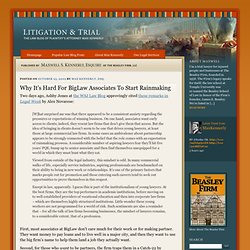
On one hand, associates want early access to clients; indeed, they resent law firms that don’t give them that access. But the idea of bringing in clients doesn’t seem to be one that drives young lawyers, at least those at large commercial law firms. In some cases an ambivalence about partnership appears to be strongly connected with the belief that the role comes with an expectation of rainmaking prowess. A considerable number of aspiring lawyers fear they’ll hit five years’ PQE, bump up to senior associate and then find themselves unequipped for a world in which they must hunt what they eat.Viewed from outside of the legal industry, this mindset is odd.
Young Lawyer's Guide To Legal Marketing (And Snark Mentoring) John Wait is a second-year attorney in North Carolina, a solo practitioner who has been trying to develop experience and a reputation by serving on the court-appointed criminal defense counsel list (a common recommendation made to new lawyers).
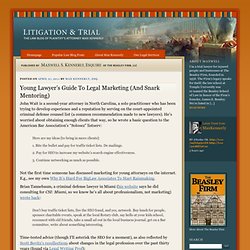
He’s worried about obtaining enough clients that way, so he wrote a basic question to the American Bar Association’s “Solosez” listserv: Here are my ideas [to bring in more clients]:1. Bite the bullet and pay for traffic ticket lists. Do mailings.2. Pay for SEO to increase my website’s search engine effectiveness.3. Not the first time someone has discussed marketing for young attorneys on the internet. Brian Tannebaum, a criminal defense lawyer in Miami (his website says he did consulting for CSI: Miami, so we know he’s all about professionalism, not marketing) wrote back: Frequently Asked Questions. Get Help Now Contact a Lawyer inNorth or South Carolina. 1.
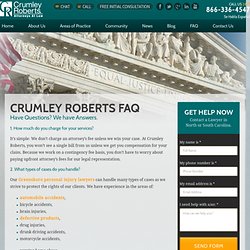
How much do you charge for your services? It’s simple: We don’t charge an attorney’s fee unless we win your case. At Crumley Roberts, you won’t see a single bill from us unless we get you compensation for your claim. 2. Our Greensboro personal injury lawyers can handle many types of cases as we strive to protect the rights of our clients. Automobile accidents, bicycle accidents, brain injuries, defective products, drug injuries, drunk driving accidents, motorcycle accidents, nursing home abuse, pedestrian accidents, Social Security Disability, truck accidents, workers’ compensation, wrongful death, and more. We’ve been helping innocent victims get through some of the most difficult times in their lives for more than 20 years, and we’re ready to help you, too. Or complete our free initial consultation form. 3. No, but it can be difficult to navigate the legal system without having experienced representation on your side. 4.
Why Contingent Fee Lawyers Don't Charge Consultation Fees. Scott Greenfield isn’t happy with people wasting his time: Marketers teach lawyers who turn to them because they need business ways to "sell" the client.
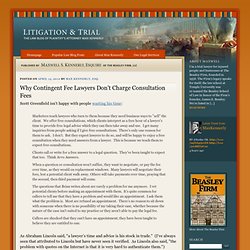
We offer free consultations, which clients interpret as a free hour of a lawyer’s time to provide free legal advice which they can then take away and use. I get many inquiries from people asking if I give free consultations. There’s only one reason for them to ask. I don’t. As Abraham Lincoln said, "a lawyer’s time and advice is his stock in trade. " Lincoln was, like Greenfield, a defense lawyer, though Lincoln was a civil defense lawyer.
Lincoln and Greenfield thus have every reason to demand compensation for all of the time and advice they contribute to a potential client’s cause: that’s their business. In contingent fee litigation, the attorney has chosen to offer as their stock in trade something other than their time and advice. How To Excel At The Basics As A Young Litigator. A year ago, I posted the Young Lawyer’s Guide To Legal Marketing.
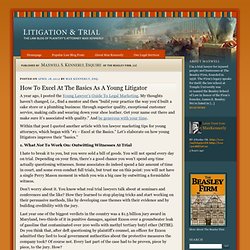
My thoughts haven’t changed, i.e., find a mentor and then “build your practice the way you’d built a cake store or a plumbing business: through superior quality, exceptional customer service, making calls and wearing down your shoe leather. Get your name out there and make sure it’s associated with quality.” And be generous with your time. Within that post I quoted another article with ten lawyer marketing tips for young attorneys, which began with “#1 – Excel at the Basics.” Let’s elaborate on how young litigators improve their “basics.” 1. I hate to break it to you, but you were sold a bill of goods. Don’t worry about it.
Last year one of the biggest verdicts in the country was a $1.5 billion jury award in Maryland, two-thirds of it in punitive damages, against Exxon over a groundwater leak of gasoline that contaminated over 200 wells with methyl tertiary butyl ether (MTBE). 2. How do you do that?